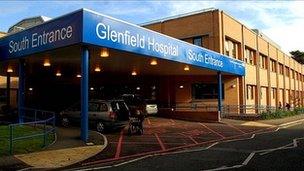Expert's warning over Glenfield Hospital's loss of ECMO unit
- Published

Children's ECMO treatment will move from Glenfield Hospital but treatment for adults will stay
About 50 babies and children will die over five years if specialist life support treatment moves from Leicester to Birmingham, an expert has warned.
Paediatric ECMO treatment, used to oxygenate the blood of patients, is to move from Glenfield Hospital.
International ECMO expert Kenneth Palmer has written to Health Secretary Andrew Lansley warning 20 years of experience will be thrown away.
Mr Lansley is currently considering advice on the impact of the decision.
ECMO has been used on children and adults at Glenfield Hospital for 20 years. The hospital has the UK's largest ECMO unit.
The children's ECMO treatment is due to move as part of national reorganisation of child heart surgery. The hospital's children's heart surgery unit is also set to move.
Leading centre
Mr Palmer, director of the ECMO unit at Karolinska University Hospital in Stockholm, Sweden, said: "Leicester has one of the highest survival rates [for patients who need ECMO] in the world.
"They could never have the same survival rate in another unit if you move it like this.
"You have to destroy it and then you have to rebuild it. There is no way you can just move treatment like this.
"I don't think you should destroy something that has been built up for 20 years just overnight like this."
He said Leicester and Stockholm were world-leading ECMO centres and both had survival rates about 10% to 20% higher than the normal rate in other parts of the world.
He estimated 10 extra children will die each year if the survival rate drops.
The letter to Andrew Lansley states: "You will take over 20 years of experience from one of the world's absolute best ECMO units and throw it away ... and probably it will take at least five years to have some kind of quality and probably 20 years to come back to top quality if it's ever possible."
'Considering advice'
The Joint Committee of Primary Care Trusts (JCPCT), which made the decision to stop child heart surgery at Glenfield, said it wants to improve services by creating fewer but larger surgical centres.
Teresa Moss, director of the National Specialised Commissioning Team, said: "A panel of independent experts, led by Sir Ian Kennedy, assessed each centre's ability to meet the proposed national quality standards both now and in the future.
"The panel ranked Birmingham Children's Hospital third out of the 11 centres. Leicester was ranked ninth.
"We are well aware of the expertise at Glenfield Hospital and it is important that this expertise is retained in the Midlands through joint planning by Glenfield Hospital and Birmingham Children's Hospital."
A statement from the Department of Health said: "A final decision on the future configuration of children's congenital heart services was made by the Joint Committee of Primary Care Trusts on 4 July.
"The Advisory Group for National Specialised Services (AGNSS) has provided advice on the impact of this decision for the nationally commissioned paediatric ECMO service at Glenfield Hospital, Leicester. The Health Secretary is currently considering the advice of AGNSS."
- Published9 July 2012
- Published5 July 2012
- Published4 July 2012
- Published4 July 2012
- Published4 July 2012
- Published19 April 2012
- Published19 April 2012
- Published27 September 2011